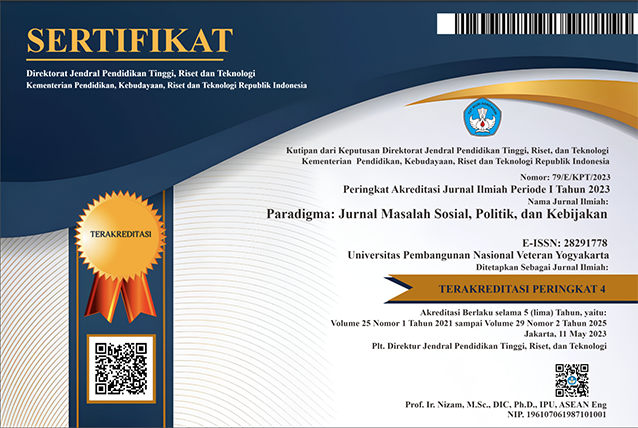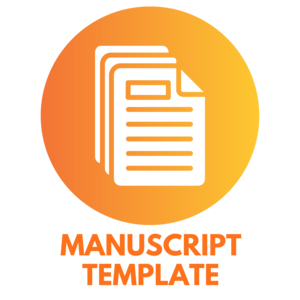Monopoli Sumber Daya Alam Sebagai Pemicu Konflik di AFRIKA TENGAH
DOI:
https://doi.org/10.31315/paradigma.v26i1.6097Keywords:
Sospol, hubungan InternasionalAbstract
Afrika tengah sebagai negara penghasil mineral dan minyaj yang melimpah. Secara dengan adanya keberlimpahan itu semestinya bisa menjadi negara yang maju melalui pengembangan teknologi ekstraktifnya, akan tetapui negara tersebut malah dilanda peperangan saudaran dan korupsi yang tidak kunjung selesai. Artikel ini bertujuan untuk menjelaskan Kembali dan melihat keterkaitan rezim politik dengan adanya kelompok bersenjata di Afrika tengah, dengan melakukan pengumpulan data primer berupa jurnal dan artikel, dan data sekunder berupa berita dan data statistic yang akan dijelaskan secara deskriptif dalam tulisan ini. Dan pada intinya bahwa keterpurukan negara di Afrika Tengah merupakan produk dari system pemerintahannya yang bermasalah baik itu dari aspek pejabat yang korup dan berbagai permasalah ekonomi lainya
References
Szeftel, M (2000), ‘Between Governance and Underdevelopment: Accumulation and Africa’s “Catastrophic Corruption”’, Review of African Political Economy.
United Nations Security Council UNSC (2001), Report of the Panel of Experts on the Illegal Exploitation of Natural Resources and other Forms of Wealth of the Democratic Republic of Congo, S/ 2001/357, New York: United Nations.
Collier, P., Venables, A.J., 2010. International Rules for Trade in Natural Resources. WTO Staff Working Paper ERSD-2010-06.
Garrett, N., Lintzer, M., 2010. Can Katanga’s mining sector drive growth and development in the DRC? Journal of Eastern African Studies 4 (3), 400–424.
Haufler, V., 2010. The Kimberley process certification scheme: an innovation in global governance and conflict prevention. Journal of Business Ethics 89, 403–416
OECD, 2010. OECD Due Diligence Guidance for Responsible Supply Chains of Minerals from Conflict-Affected and High-Risk Areas, Paris.
United Nations Security Council, 2010. Report S/2010/596, Final report of the Group of Experts on the DRC, 29 November 2010.
United Nations Conference on Trade and Development (UNCTAD), 2008. Economic Development in Africa. Export Performance Following Trade Liberalization: Some Patterns and Policy Perspectives. Geneva
.
United Nations Conference on Trade and Development (UNCTAD), 2010. Economic Development in Africa. Report 2010. Sout-South Cooperation: Africa and the New Forms of Development Partnership. Geneva.
United Nations Security Council, 2008. Report S/2008/773, Final report of the Group of Experts on the Democratic Republic of the Congo, 12 December 2008. USGS, 2011a.
United Nations States Geological Survey, different years. Minerals Information Niobium (Columbium) and Tantalum Statistics and Information.
/http://minerals.usgs.gov/minerals/pubs/commodity/niobium/S [November 5, 2021].
Ross, M.L., 2003, Oil, drugs, and diamonds—The varying roles of natural resources in civil war
in Ballentine, K., and Sherman, J., eds., The political economy of armed conflict—Beyond greed and grievance: Boulder, Lynne Rienner Publishers, h. 47-40.
ICGLR Regional Initiative against the Illegal Exploitation of Natural Resources (RINR)
Yeboah, Stephen, 2010. “Ghana: Why ‘Militarization’ in the Mining Sector Must Stop, vol. 25. ”
Wilson, M.C., Piazza, J.A., 2013. Autocracies and terrorism: conditioning effects of authoritarian regime type on terrorist attacks. Am. J. Polit. Sci. 57 (4), 941–955.
Wick, K., Bulte, E.H., 2006. Contesting resources–rent seeking, conflict and the natural resource curse. Publ. Choice 128 (3–4), 457–476.
Vreeland, J.R., 2008. The effect of political regime on civil war: unpacking anocracy. J. Conflict Resolut. 52 (3), 401–425.
Ross, M.H., 1993. The Culture of Conflict: Interpretations and Interests in Comparative Perspective. Yale University Press. Ross, M.L., 2004a.
What do we know about natural resources and civil war? J. Peace Res. 41 (3), 337–356. Ross, M.L., 2004b.
What do we know about natural resources and civil war? J. Peace Res. 41 (3), 337–356.
Frynas, J. G., & Buur, L. 2020. The presource curse in Africa: Economic and political effects of anticipating natural resource revenues. The Extractive Industries and Society.
Adedoyin Babajide, Ahmad Hassan Ahmad, Simeon Coleman. 2021. Violent Conflicts and State Capacity: Evidence from Sub-Saharan Africa, Journal of Government and Economics,
Ajide, K. B., Adenuga, J. I., & Raheem, I. D. (2020). Natural resource rents, political regimes and terrorism in Africa. International Economics
Downloads
Published
How to Cite
Issue
Section
License
The manuscript submitted to Paradigma: Jurnal Masalah Sosial, Politik, dan Kebijakan journals are released under the license of Creative Commons Attribution-Non Commercial- ShareAlike (CC BY SA) if and when the article is accepted for publication.
We declare that:
- This paper has not been published in the same form elsewhere.
- It will not be submitted anywhere else for publication prior to acceptance/rejection by this Journal.
- A copyright permission is obtained for materials published elsewhere and which require this permission for reproduction.
Retained Rights/Terms and Conditions
Authors retain all proprietary rights to the published works, such as (but not limited to) the following rights:
- Copyright and other proprietary rights relating to the article, such as patent rights,
- The right to use the substance of the article in own future works, including lectures and books,
- The right to reproduce the article for own purposes,
- The right to self-archive the article
The right to enter into separate, additional contractual arrangements for the non-exclusive distribution of the article's published version (e.g., post it to an institutional repository or publish it in a book), with an acknowledgment of its initial publication in this journal Paradigma: Jurnal Masalah Sosial, Politik, dan Kebijakan



